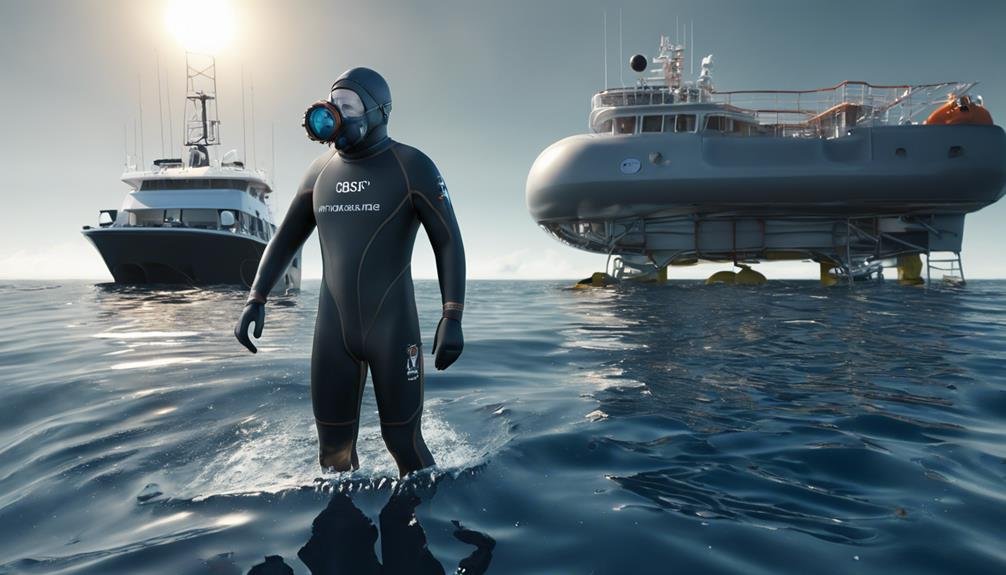Oceanographer Job Description
Enter the world of oceanography, where you immerse yourself in marine mysteries and pioneer conservation efforts. Require a bachelor's in marine science or related fields. Engage in data collection using advanced technology for precise mapping and water analysis. Explore data to reveal marine ecosystem insights and hidden correlations. Venture on fieldwork, setting up specialized tools and analyzing marine life diversity firsthand. Team up with experts, fostering innovation and shaping conservation strategies. Explore a dynamic career in oceanography to discover the wonders of our oceans and make a lasting impact.
Key Takeaways
- Hold a bachelor's degree in marine science, oceanography, or related field.
- Engage in rigorous research, data collection, and analysis of marine ecosystems.
- Conduct fieldwork and expeditions to gather data on oceanographic parameters.
- Collaborate with scientists across disciplines and communicate findings effectively.
- Analyze data to assess climate change impacts and inform conservation efforts.
Education and Training Requirements
To become an oceanographer, you must typically hold a minimum of a bachelor's degree in a related field such as marine science, oceanography, or environmental science. Degree programs in oceanography equip students with a solid foundation in physics, chemistry, biology, and geology as they relate to the oceans. These programs often include coursework in marine ecosystems, ocean dynamics, coastal processes, and marine pollution. Additionally, many aspiring oceanographers pursue internships to gain practical experience and expand their professional network. Internship opportunities provide hands-on experience in areas such as ocean research, data collection, laboratory analysis, and fieldwork.
Participating in internships allows individuals to apply theoretical knowledge to real-world situations, develop essential skills, and determine specific areas of interest within the field of oceanography. Through these experiences, aspiring oceanographers can build a strong resume, acquire valuable references, and increase their chances of securing employment in this competitive field. Moreover, internships provide a glimpse into the daily responsibilities and challenges faced by oceanographers, helping individuals make informed decisions about their future career paths.
Research and Data Collection
Engage in rigorous research and meticulous data collection processes to deepen your understanding of oceanographic phenomena and contribute to the advancement of marine science. As an oceanographer, your work in research and data collection plays an essential role in unraveling the complexities of marine habitats and their responses to phenomena like climate change.
Utilize cutting-edge technology such as autonomous underwater vehicles to explore and map marine habitats with precision.
Collect water samples at various depths to analyze temperature, salinity, and nutrient levels, providing vital insights into the impact of climate change on ocean ecosystems.
Conduct biodiversity surveys to document the species inhabiting different marine habitats, aiding in conservation efforts and understanding ecosystem dynamics.
Deploy sophisticated instruments like buoys and drifters to gather real-time data on oceanographic parameters, enabling continuous monitoring of changes influenced by climate variations.
Through your dedicated research and detailed data collection efforts, you contribute significantly to the broader understanding of marine environments and the implications of climate change on these delicate ecosystems.
Analysis and Interpretation
Explore the intricate process of analyzing and interpreting oceanographic data to extract valuable insights into marine ecosystems and their responses to environmental factors. Data analysis in oceanography involves sorting through vast amounts of information collected from various sources such as satellites, buoys, and research vessels. Through meticulous examination, patterns and trends within the data are identified, allowing oceanographers to draw meaningful conclusions about the health and dynamics of marine environments.
Scientific research forms the foundation of data analysis in oceanography, with researchers employing advanced statistical techniques and modeling tools to uncover hidden relationships within the data. By analyzing temperature, salinity, nutrient levels, and other parameters, scientists can assess the impact of climate change, pollution, and other stressors on marine ecosystems. Interpretation of these findings is essential for informing conservation efforts, policy decisions, and sustainable resource management practices.
In essence, the analysis and interpretation of oceanographic data play a critical role in advancing our understanding of the oceans and their intricate interconnections with the Earth's systems.
Fieldwork and Expeditions
Field researchers meticulously collect data during expeditions at sea, employing advanced techniques to study marine ecosystems firsthand. This hands-on approach is essential for advancing our understanding of the oceans. Here are some key aspects of fieldwork and expeditions in marine exploration and underwater research:
- Equipment Setup: Setting up specialized equipment like underwater cameras, sonar systems, and water sampling devices requires precision and expertise.
- Data Collection: Gathering data on water temperature, salinity, currents, and marine life diversity is a meticulous process that demands attention to detail.
- Sample Analysis: Conducting on-the-spot analysis of water samples and marine organisms provides real-time insights into the health of the ecosystem.
- Navigational Skills: Piloting the research vessel through varying sea conditions while adhering to research plans is essential for the success of the expedition.
During these expeditions, oceanographers work tirelessly to unravel the mysteries of the deep sea, contributing valuable knowledge to the field of marine science.
Collaboration and Communication
One must recognize that effective collaboration and clear communication are paramount in the intricate field of oceanography, facilitating the sharing of insights and data among researchers. In oceanography, team dynamics play an essential role in conducting research expeditions, analyzing data, and problem-solving. As an oceanographer, you'll often collaborate with scientists from different disciplines, requiring excellent communication skills to make sure that findings are accurately interpreted and applied.
Engaging in science communication and public outreach is also a significant aspect of an oceanographer's role. It involves translating complex scientific concepts into accessible language for a broader audience. By effectively communicating research findings and their implications, oceanographers contribute to raising awareness about the importance of ocean conservation and sustainability.
Furthermore, collaboration within research teams allows for a diversity of perspectives, enhancing problem-solving abilities and fostering innovation. Clear communication channels enable seamless sharing of data, methodologies, and results, ultimately leading to advancements in the field of oceanography. Embracing collaboration and communication as integral parts of your work as an oceanographer won't only enrich your research but also contribute to the broader scientific community's understanding of the world's oceans.
Frequently Asked Questions
What Are the Typical Challenges Faced by Oceanographers in Their Daily Work?
In your daily work as an oceanographer, you face challenges like data analysis complexities and sample collection difficulties. These hurdles demand precise attention to detail, analytical thinking, and a deep understanding of the marine environment.
How Do Oceanographers Stay Updated on the Latest Advancements in Their Field?
To stay updated on the latest advancements in oceanography, you utilize online resources, attend conferences, read scientific journals, and participate in workshops. By engaging with these platforms, you guarantee you are at the forefront of your field.
What Are the Safety Protocols Followed During Underwater Research Activities?
When performing underwater research, make sure your dive equipment is properly maintained and check for any malfunctions. Familiarize yourself with emergency procedures, including communication signals and ascent protocols, to mitigate risks and respond effectively to unforeseen situations.
How Do Oceanographers Handle Unexpected Weather Conditions During Expeditions?
When unexpected weather strikes during expeditions, oceanographers swiftly activate emergency procedures, ensuring safety. Communication strategies are crucial for coordinating responses. By monitoring conditions and adapting swiftly, you navigate challenges with expertise and precision.
What Career Opportunities Exist for Oceanographers Outside of Traditional Research Roles?
Explore diverse industry opportunities as an oceanographer. Consulting roles offer chances to apply expertise in various sectors. Engage in policy advocacy to shape marine conservation. Educational outreach allows sharing insights with broader audiences.
Conclusion
To sum up, as an oceanographer, your role involves:
- Conducting research
- Collecting data
- Analyzing and interpreting findings
- Participating in fieldwork and expeditions
- Collaborating with colleagues
The dynamic and diverse nature of this profession requires a keen eye for detail, a passion for exploration, and a commitment to scientific inquiry.
By combining your skills and expertise in oceanography, you can contribute to the understanding and preservation of our planet's vast and mysterious oceans.







